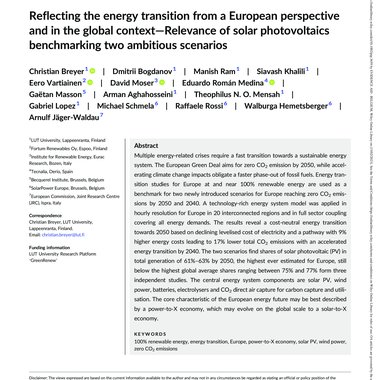
Reflecting the energy transition from a European perspective and in the global context—Relevance of solar photovoltaics benchmarking two ambitious scenarios
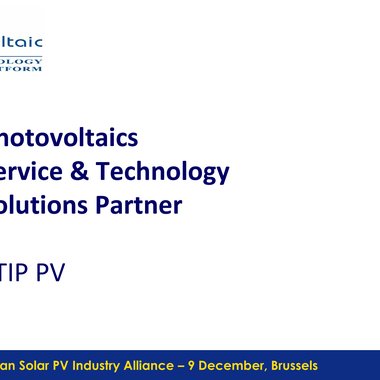
Bechmarking of production cost and support schemes in different regions
This document compares the productions costs, the support schemes and the components costs in Europe and different regions like USA, China, India and Turkey.
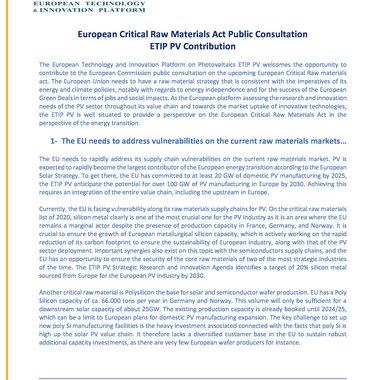
European Critical Raw Materials Act Public Consultation ETIP PV Contribution
The European Technology and Innovation Platform on Photovoltaics ETIP PV welcomes the opportunity to
contribute to the European Commission public consultation on the upcoming European Critical Raw materials
act. The European Union needs to have a raw material strategy that is consistent with the imperatives of its
energy and climate policies, notably with regards to energy independence and for the success of the European
Green Deals in terms of jobs and social impacts. As the European platform assessing the research and innovation
needs of the PV sector throughout its value chain and towards the market uptake of innovative technologies,
the ETIP PV is well situated to provide a perspective on the European Critical Raw Materials Act in the
perspective of the energy transition.
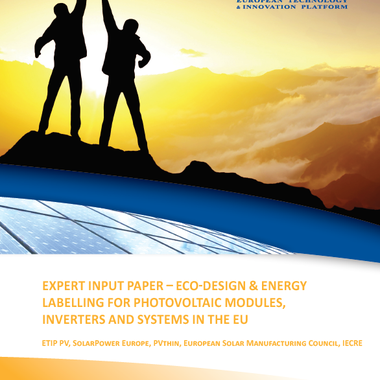
Expert input paper on eco-design & energy labelling for photovoltaic modules, inverters and systems in the EU
This report is the the result of a Joint Mission Group of Solar Industry Experts and Researchers, building on the findings of the European Commission Preparatory Study for Eco-Design, Energy Labelling, Green Public Procurement and Ecolabelling. The findings of the Expert Input Paper aim to support the criteria development process within the framework of compulsory policy instruments further evaluated in the supporting study.
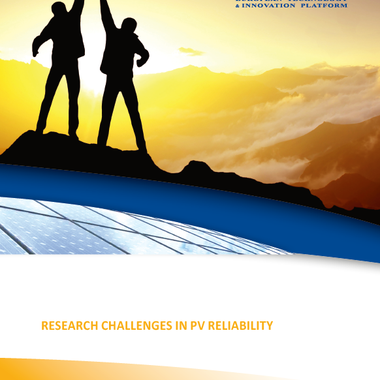
Research Challenges in PV Reliability
Reliable solar PV power plants will deliver the expected performance throughout their entire service life. They will experience very limited component degradation, failures or system down-time. Improving reliability means derisking electricity production and return on investment of PV systems. Mitigation of risks supports the bankability of PV systems and serves as an enabler for accelerated deployment of solar PV technologies. Ongoing basic research remains necessary for the photovoltaic industry to continue advancing its knowledge and improving lifetime system performance. This document addresses the foundations and reasons why reliability research is crucial to the solar PV industry’s continued growth.
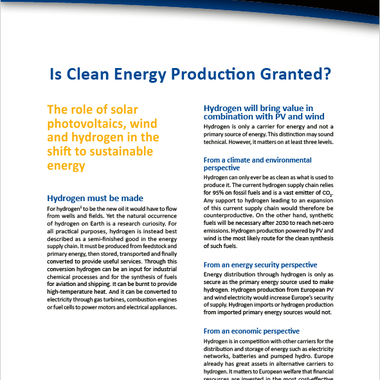
Is Clean Energy Production Granted? The role of solar PV, wind and hydrogen in the shift to sustainable energy
Hydrogen is only a carrier for energy and not a primary source of energy and it can only ever be as clean as what is used to produce it. The current hydrogen supply chain relies for 95% on fossil fuels and is a vast emitter of CO2. Any support to hydrogen leading to an expansion of this current supply chain would therefore be counterproductive. On the other hand, synthetic fuels will be necessary after 2030 to reach net-zero emissions. Hydrogen production powered by PV and wind is the most likely route for the clean synthesis of such fuels.
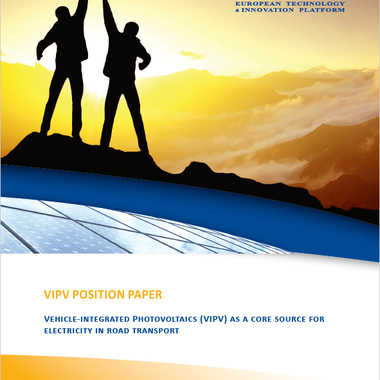
Vehicle-integrated Photovoltaics (VIPV) as a core source for electricity in road transport
The growing awareness of the global need for sustainable mobility empowers the application of new technological innovations to the road transport sector. Vehicle integrated photovoltaic technology (VIPV), however, is still considered a questionable issue in the automotive community. The ecological and economic value of VIPV is yet not evident. This paper aims to give an overview of the global VIPV market, in particular, the current status and future potential of PV-powered vehicles. Additionally, it studies possible added value for users, communities and stakeholders mostly focusing on batteryoperated electric vehicles (BEVs). Other VIPV applications for solar race vehicles, as well as ships, planes, trains and other small vehicles are outlined and evaluated as well. Concentrating on different Use Cases the paper estimates the economic and environmental viability of PV from technical viewpoints. In conclusion, this paper outlines strategies for integrated research and development and clarifies the main obstructions to VIPV introduction.
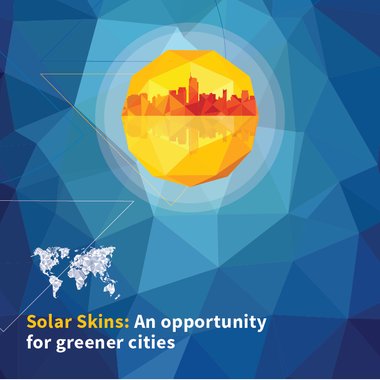
Solar Skins: An opportunity for greener cities
Solar photovoltaic (solar PV) electricity has recently become the lowest cost source of electricity in most parts of the world. Solar PV supports a socially just and acceptable energy transition and integrated applications, as well as new business opportunities. This report is focusing on one of these new business opportunities. It aims at describing the added value of Building Integrated Photovoltaics (BIPV) for a successful energy transition in European cities, as well as the related opportunities for EU businesses. It describes the regulatory and market framework needed for sustainable business models for BIPV, that are adapted to city planning constraints and specificities.
This publication is a joint report of ETIP PV and SolarPower Europe.
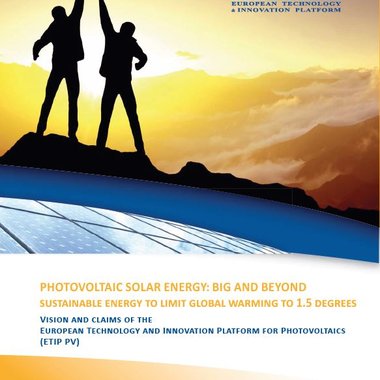
'Photovoltaic Solar Energy: Big and Beyond. Sustainable energy to limit global warming to 1.5 degrees' Vision and claims of the European Technology and Innovation Platform for Photovoltaics
The paper provides the evidence base to support our paper “Photovoltaic Solar Energy: Big and Beyond – vision and claims of the European Technology and Innovation Platform for Photovoltaics (ETIP PV)” released for the COP24 intergovernmental climate conference in Katowice, and now available in several languages. It also expands on the points mentioned.
The report uses the notion of defossilisation. This term builds on the more familiar “decarbonisation”, but recognises that it is not carbon atoms per se that must be prevented from reaching the atmosphere, but those carbon atoms that come from a fossil source.